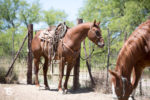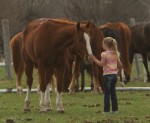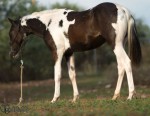
My post earlier this week “Horse Slaughter”drew a lot attention with a lot of different comments that I really enjoyed reading. Even though this topics brings opinions, feelings and emotions all across the board I was surprised at the number of people that understood what I was trying to say and were neither offended it or against it. There were a lot of neat stories shared and a lot great points made. I would like to have some guest blog post in the following weeks with your thoughts. If you are willing to share them please EMAIL ME your post just how you would like it to appear and I would be thrilled to add it. Also please be sure to let me know if you want the post to be anonymous or you would like your name included. But lets keep in mind that this is an emotional enough topic as it is and even though I want to hear what everybody things and love all the comments please, lets keep it civil.
Below is some interesting information that a friend of mine wrote as a guest blog post for me.
Please take a few moments to read it.
Back a few years ago, we had processing plants all over, Oregon, Washington, Nebraska, Texas, and several places on the east coast. Horses did not have to be transported very far, thus being much easier on them. They were loaded on trucks, however not cramped to get all they could get on, as it wasn’t far to travel, the remaining would be loaded onto goosenecks. When they were being processed in the US, it was important not to have the meat bruised or damaged. Just like with fat cattle that go to slaughter today, from the feedlots, they are loaded quietly and carefully on the truck to keep from bruising the meat and doing any harm to it, as then it becomes no good. Theses plants were just like you describe in Germany, you could take your horse right to the plant and if so chosen, you could watch as they put the horse down. It was quiet, much more humane and it was somewhere for the unwanted horses to go. So I agree with you, (referencing to the early BLOG POST) even though I don’t want take anything to slaughter, it does give people options and it keeps our horses from being dumped, abandon and starving.
The above was the first comment to which more information was added to clarify to topic.
When they actually band the processing of horse in the US there was only one plant open and that was in Chicago,IL. The other plant right before that was the one in Fort Worth, Tx. Prior to that there were plants in Redmond, OR.; Woodenville, WA; North Platte, NE. I had a good friend that was known as a killer buyer, he would buy all classes of horses. Would take them home and go through them. The ones that were broke and useable, or even ones that weren’t broke but seem to be kind and sound, they would better their training or overall condition and find homes for them right out of their place, they did not return to a sale. Then the ones that were blind, crippled or had harmful dispositions about them, would be hauled by a gooseneck stock trailer straight to the processing plant, in Woodenville, WA. I had been to the plant in NE and in OR. Both were decent facilities and not bad settings. They had big pens with dirt floors. There would only be a few horses to a large pen. It really wasn’t a bad environment. The horses were not crammed or abused in anyway. They were kept real quiet and moved easy. Something I think we should all keep in mind is when horses were processed for human consumption,in the US. the plant and the meat had to be inspected by the USDA federal inspector, funded by the US goverment. There was a federal inspector on site the whole time thru processing and shipping of all horses/meat. The plant facility, works, ect. all had to pass the federal inspection on a daily bases. The plant was not allowed to operate without an inspector on site, at all times. If any inhuman treatment was present the federal inspector would shut the plant down. Now your going to ask, “why did those plants close right?!?!” What happened, was the animal rights activist, the “bleeding hearts” put pressure on the congress and senators to pass a bill that the president signed. That bill was to DEFUND the federal inspector. Without a federal inspector the plant could not process and ship any meat for human consumption, therefor the plant or plants were going broke and closing. That is what shut the plants down, they had no US federal inspectors. NO meat for human consumption, can be shipped out of the US without an inspector and a USDA stamp. After the bill was passed the Chicago and Texas plants were only processing for Zoo meat, which does not require a federal inspector to be present. There was no inspector to supervise the treatment, the conditions or anything else for thoses horses. Those plants could not make enough money just selling to the zoo’s and so due to lack of funds close their doors.
















